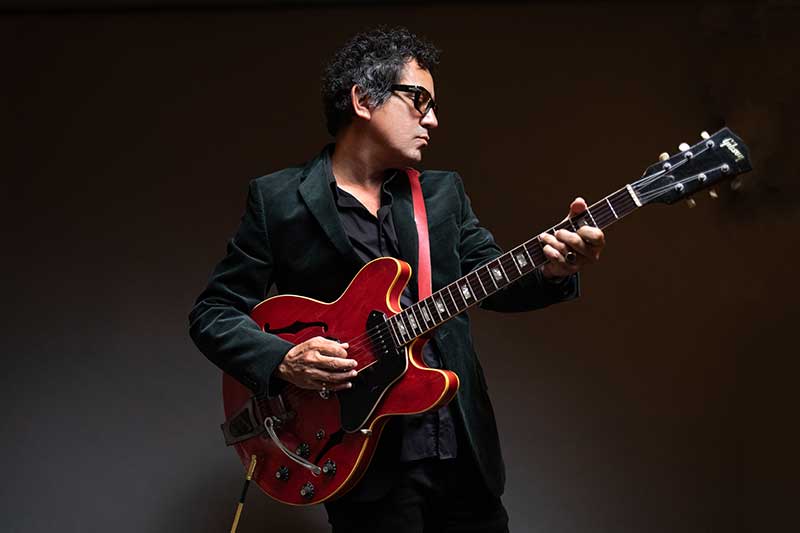
Photo of A.J. Croce by Jim Shea
‘Heart of the Eternal’
Opens the Second Chapter for A.J. Croce
BY SHERYL ARONSON
With the release of his 11th studio album, “Heart of the Eternal,” Adrian James “A.J.” Croce compiles a delicious recipe of eclectic songs that highlight his aptitude for fusing rock, blues, gospel and soul. In addition to exploring diverse musical roadways, Croce delves deep into psychological and spiritual themes with curiosity, humor and homegrown wisdom earned along life’s painful paths.
Writing lyrics like these: Inside a rear-view mirror, I see my life defined. I feel the love and fear. I feel a peace of mind. Is there a state of grace along the finest line?
Croce’s self-reflection graciously offers listeners hope, questioning and care.
At an early age, he found refuge in music and journeyed inwardly, developing a unique worldview through songwriting and crazy-good piano chops. That passion opened the door to a successful career in music. At just 15, Croce wrote “I Found Faith,” exploring themes of love, faith, death and loss. Before the age of 2, he lost his father, Jim Croce. He also lost his sight at 4 and his family’s home burned down when he was 15.
Self-taught on the piano, Croce played his first gig at 12 and performed in San Diego nightclubs by 16. A few years later, he hit the road as a sideman for legends like B.B. King and Taj Mahal.
Working with producers T Bone Burnett and John Simon, Croce recorded his 1993 debut “A.J. Croce,” followed by “That’s Me in the Bar,” with Jim Keltner and featuring Ry Cooder and David Hidalgo (of Los Lobos). He went on to release “Fit to Serve,” “Transit,” “Adrian James Croce” (winner of Best Pop Album at the San Diego Music Awards), “Cantos,” “Cage of Muses” and “Twelve Tales.”
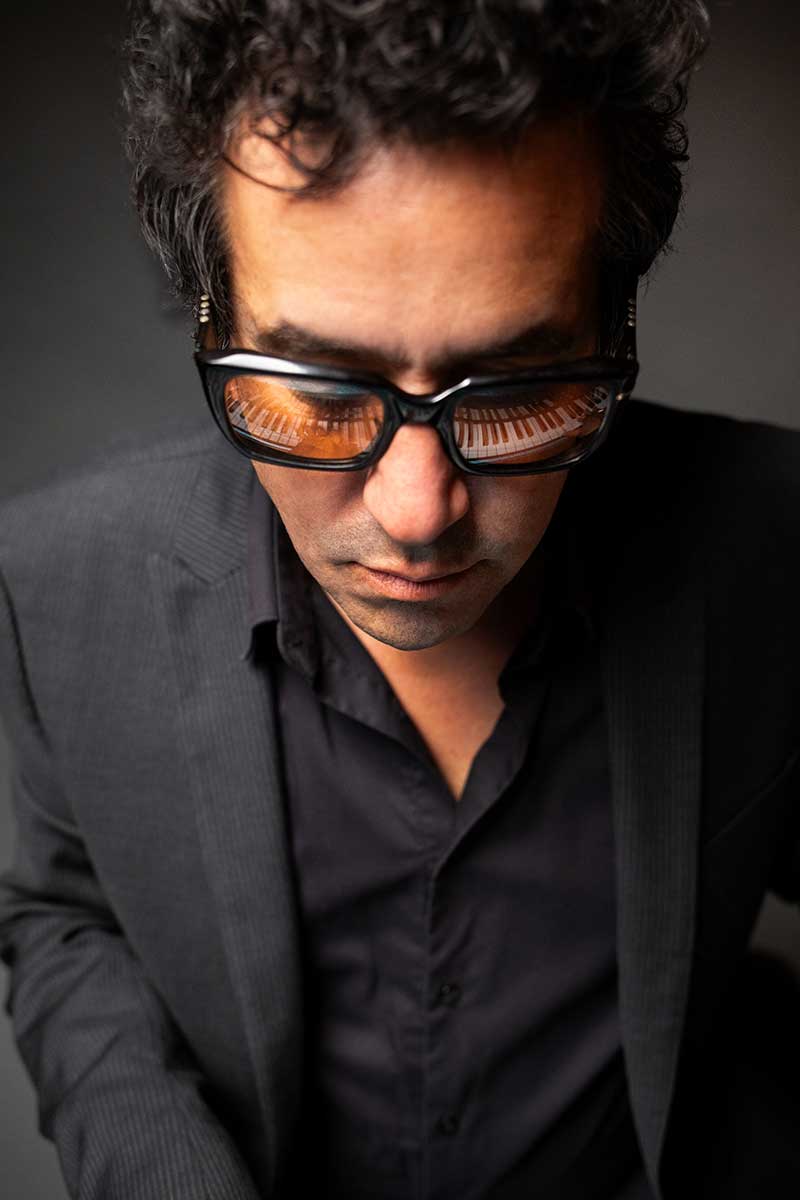
Photo of A.J. Croce by Jim Shea
I spoke with Croce by phone as he traveled by tour bus to a show in Massachusetts. Following the March 7 release of “Heart of the Eternal,” he’s been touring the country and parts of Canada—and loving every moment. He expressed his surprise that fans already knew songs from the album and requested that he play them.
This project marks Croce’s first release of original music since 2017. He released a well-received cover album, “By Request,” in 2021.
“I’m always writing, but I haven’t been ready to tour due to the unexpected loss of my wife and then the isolation of the pandemic,” he told me.
Over the course of our conversation, Croce sounded relaxed—even joyful—as he expressed gratitude for a new chapter in his life: new love, new music and a readiness to honor his father’s legacy with a new show, “Croce Plays Croce.”
“What I needed to do was figure out how to write a show that would incorporate my father and myself—and the influences that shaped us both as artists.”
Chic Compass: Congratulations on your newest album, “Heart of the Eternal.” How is the tour going?
A.J. Croce: Thank you very much. It’s going amazingly well. The reaction to the new songs is shocking to me. The album came out recently, and people are already requesting songs from the new album at the concerts. That’s a great sign.
Chic Compass: You have a big following. People are excited about the new music, which is lovely for you.
A.J. Croce: I’ve had the opposite reaction too. (He laughs.) I’ll take it when people pay attention to my new music.
Chic Compass: You became an artist at a very young age. What are your earliest recollections of wanting to be a musician?
A.J. Croce: I wanted to be an artist and create music early on as a child. It was a calling. I’m a piano player first and foremost. I was blind for six years during my childhood, and that played a big role in my evolution as an artist and as a composer. It shaped how I hear music and how I think about music.
When I was about 12, I played at a friend’s party and was paid $20. I thought if I kept practicing and working hard, I could play music well. I had other interests besides music, but music was the most powerful, inspiring and the greatest refuge.
Chic Compass: How was music a refuge for you?
A.J. Croce: I don’t know how deep you’d like me to go.
Chic Compass: Please, go as deep as you feel comfortable.
A.J. Croce: I was less than 2 years old when my father died. When I was 4, I lost my sight. I was in the hospital for six months. From the ages of 4 to 10, I was completely blind but have since regained sight in one of my eyes. The piano was a solitary and beautiful place to reflect and feel emotions. I didn’t feel safe as a kid, and music allowed me to feel safe.
Chic Compass: It’s extremely important as a child to know you have that aspect of safety. It sounds like you created a whole world for yourself at the piano, and that’s inspirational—and probably healing. Maybe you were able to express anger, sadness or hurt—emotions that you couldn’t verbalize.
A.J. Croce: I think all humans do that regardless of their surroundings. We’re constantly trying to understand where we are at the moment and where we want to go from here. It’s universal.
Playing music was my way of connecting with others, and music still holds that power. Music is a wonderful way to communicate, and when you tap into the universal truths of any story, you see the outcome and the response from the audience. It’s palpable and very emotional. Music has the power to stop time, and that is magical.
Chic Compass: What influences were you pulling from as you matured as a piano player and artist?
A.J. Croce: Ray Charles and Stevie Wonder were my gateway and inspiration because I’d lost my sight. I also listened to the old blind blues piano players and guitarists like Blind Blake and Blind Willie McTell from the ’20s, ’30s and ’40s. As a kid, I avidly listened to this music and the rock ‘n’ roll playing on the radio, plus my father’s diverse record collection—soul music, lots of R&B, country, great jazz and blues—was a big influence. When I was 15, I played with a rock ‘n’ roll garage band. We covered ’60s-style rock and R&B, Etta James or Jimmy Reed.
I also played solo in piano bars, jazz bars and blues clubs. I was learning the American Songbook and refining my chops. At 16, Floyd Dixon asked if I would travel with him. Floyd wrote the famous drinking songs like “Hey Bartender” and “Wine, Wine, Wine.” I would go out on weekends and open for him. Then, at 17, I met Mae Boren Axton, who invited me to Nashville to record with Jack Clement. In my first session, I filled in for Jerry Lee Lewis. He walked out as I walked in. It was overwhelming.
That was the moment I realized I would be making and playing music as a career, even though the music might not be mainstream and would be a lot of work. Initially, I was hired in these settings as a piano player, not as a singer, but I continued developing my singing and composing skills. These skills didn’t develop equally at the same time. I was a stronger piano player before I was a singer or songwriter. I didn’t pick up the guitar until my 30s. As a guitarist, I’m starting to become good at it, whereas with piano, I have great confidence.
Chic Compass: Your mother gave you your father’s guitar. Was that the reason you started to play?
A.J. Croce: There were a lot of factors, that being one of them. As a songwriter, I saw thousands of options on the piano when I composed, and that could get in the way of storytelling. I discovered that if I could simplify things, the story would be easier to hear. On the guitar, I only knew four or five chords initially, which helped me simplify my songwriting.
On the same trip to Nashville, I decided to get a venue to play a concert. There was a brand-new club called the Bluebird, and the manager said, “We’d love to have you. Come back tomorrow and we’ll give you an upright piano.” I was performing for a lot of songwriters there and people were curious about me. At 17, I was young, but the songs I performed resonated with the audience. Also, having the legendary Steve Cropper come up to me after the show and encourage me greatly boosted my confidence.
At 18, I started touring with many musicians. At 15, I wrote “I Found Faith,” which ended up on my first album. To me, this was a breakthrough. Here’s a perspective: This is a piece of who I am, and it resonated with me.
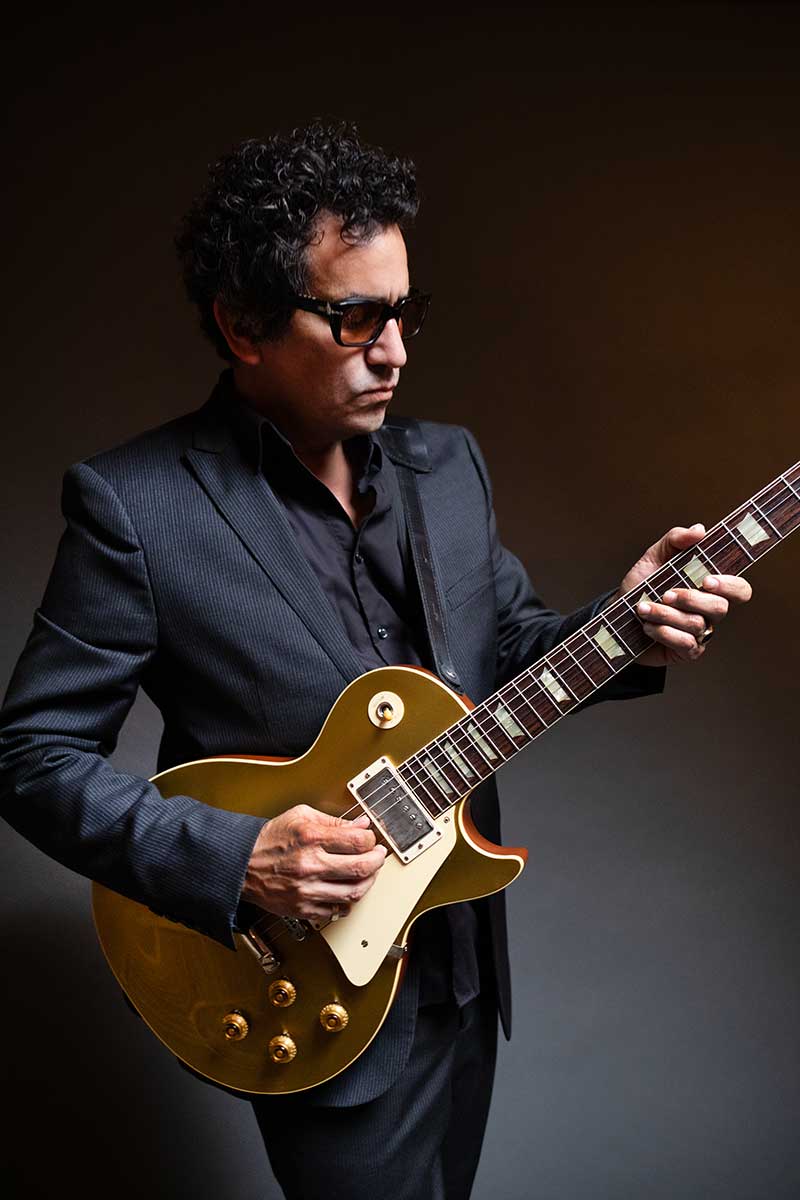
Photo of A.J. Croce by Jim Shea
Chic Compass: When did you put out your first album?
A.J. Croce: The first project had its roots in soul, rock ‘n’ roll and jazz. When I started touring with B.B. King, I didn’t have a manager or an agent. I had just signed a publishing deal but didn’t have a record label.
As we went from Vancouver down the West Coast, it seemed like every day there was a new connection to someone who wanted to be involved in the future of my career. It took a couple of years before everything fell into place. My first record didn’t come out until I was 19. I was on tour with a lot of artists such as Taj Mahal and the Nevilles, which brought me a real connection to New Orleans. I was learning and writing every day.
Chic Compass: I know you were always thinking about being your own person, not living under your father’s fame. You’ve played many genres of music and have had extensive exposure. How did you carve out your own voice?
A.J. Croce: The process or idea of myself as an artist has not changed much. I’m as open as ever and interested in learning and progressing. I will never rest on what I’ve already done. I will always push myself to create something new and different. When someone knows I have a famous relative, I feel that maybe I’ll never be an individual again. I will never be interviewed by someone who doesn’t think about my father, or I’ll never meet anyone who knows that we have that connection and doesn’t think of him when they think of me. He was so much a part of their popular culture. It’s not that I’m angry about it. The reality of celebrity and renown is incredibly unusual, and the idea that you can be an individual when you are related to someone well-known is not the case. I know who I am and am confident in my identity.
Chic Compass: I’m very interested in you as an individual artist. Your career has been amazing; you’ve played with many incredible people. In 2017, you last wrote your own individual songs. What happened between then and this new album, “Heart of the Eternal?”
A.J. Croce: First, I write every day. It’s not that there was a lack of material. But after “Just Like Medicine” was released, I went on tour. During that time, everything was going well. In the summer of 2018, however, my wife suddenly passed away. This event completely changed my life. My children were grown up at the time—my son was 21 and my daughter was 28—and it was extremely hard for me. She was the person who knew me better than anyone else and was my sounding board for ideas. She was my best friend. I stopped touring to regroup.
I started touring again in 2019, and then the pandemic hit in early 2020. I realized then that I wasn’t ready to be that vulnerable to write new songs. I decided to play cover songs by other people. It was an effective way to share the music I had been playing at home from friend requests. I needed that kind of community, especially during the lockdown.
It was during this time that I met my girlfriend, who had experienced a similar loss with her late husband. He was a musician I had known for 25 years but hadn’t seen very often. As I was starting a new relationship and falling in love, I noticed a second chapter unfolding. I had a lot to write about again.
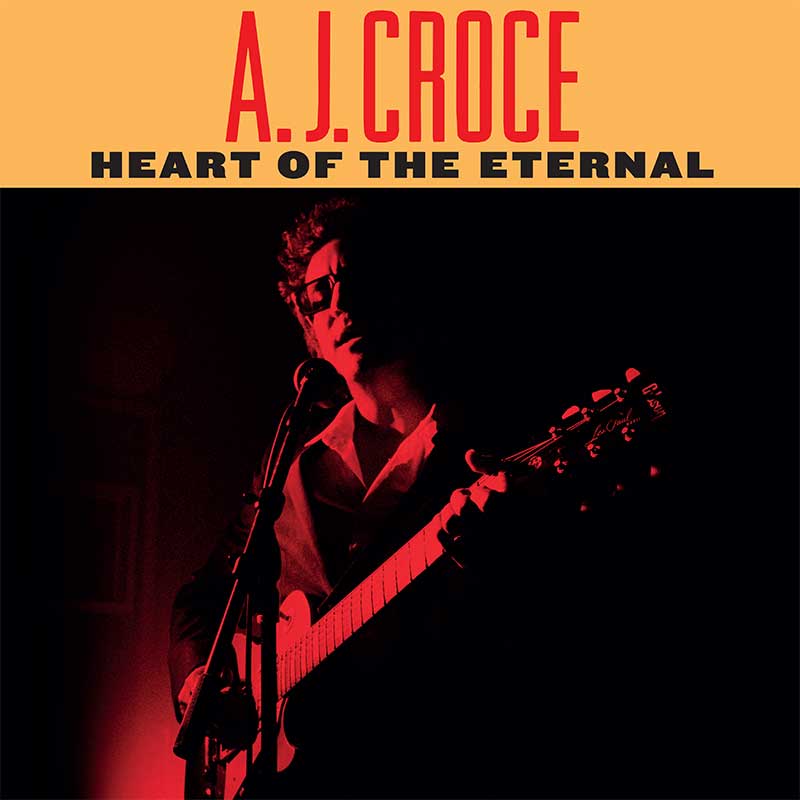
“Heart of the Eternal” album cover
Chic Compass: Let’s talk about some of the songs on your new album, “Heart of the Eternal.” There are songs about relationships and love. Is “I Got a Feeling” a nod to your father’s “I Got a Name?”
A.J. Croce: This song had nothing to do with that. Charlie Fox wrote it. The song came from a psychedelic soul feeling, like Shuggie Otis, the Chambers Brothers, and Sly and the Family Stone. The lyrics became conversational, and I wanted it to represent a more esoteric side of lyric writing.
When I returned to Nashville, I had been thinking about working with Tommy Sims, a great bass player and songwriter. He’s written for Eric Clapton and worked with Toni Braxton and Babyface. He and I got together, and I played him the music. We took the lyrics that I had added, and it became a song.
Chic Compass: I love the way you play the keys. It sounds so cool.
A.J. Croce: I also get to play lead guitar, and that’s fun.
Chic Compass: How was it working on the song “Reunion” with John Oates? That’s a lovely song—very spiritual—and deals with how people move toward the end of their lives.
A.J. Croce: The song came about because John had just gone to see his father, who was 100 years old. He told John that he was ready to have his reunion with the people he loved and the people he’d lost. The first time John played it for me, he was playing it in 4/4 time. I said it feels like it could be a gospel song. I put it in 6/8 and played it like that. John’s such a wonderful collaborator. He recorded his way for his LP, and I recorded the song my way. I loved this song so much that I also wanted to share it.
Chic Compass: “The Complications of Love.” Here’s what I found interesting because of my work with couples as a relationship therapist—I understood the lyrics very well. I call it the intimacy dance, where somebody wants to get close to their partner, but the partner feels scared, so they pull away. Then you go, well, if you pull away, I will pull away. “The Complications of Love” explains the dilemma beautifully.
A.J. Croce: I wrote the song on guitar, which was a good way to practice my diminished scales, that sort of Django Reinhardt sound. The song is a three-chord pop song, and it’s very moody and yet playful. There’s a certain amount of tongue-in-cheek aspect too. Dysfunctional is exactly what a relationship can be at times.
Chic Compass: On the song “The Finest Line,” you’re dealing with death again. I love the lyrics: Inside a rear-view mirror, I see my life defined. I feel the love and fear. I feel a peace of mind. Is there a state of grace along the finest line? That’s a great question; it also helps us think about life and how we can attain that state of grace. As an artist, have you found a state of grace?
A.J. Croce: I’ve had it for a long time. It’s about being open and curious, maintaining an interest in life and being open to new experiences. Also, I embrace having a sense of humor and being able to laugh at myself. Being forgiving is a huge part of being an adult and a happy human being. In forgiveness, there’s an acceptance of certain things in life. This has played a part in defining the person I am.
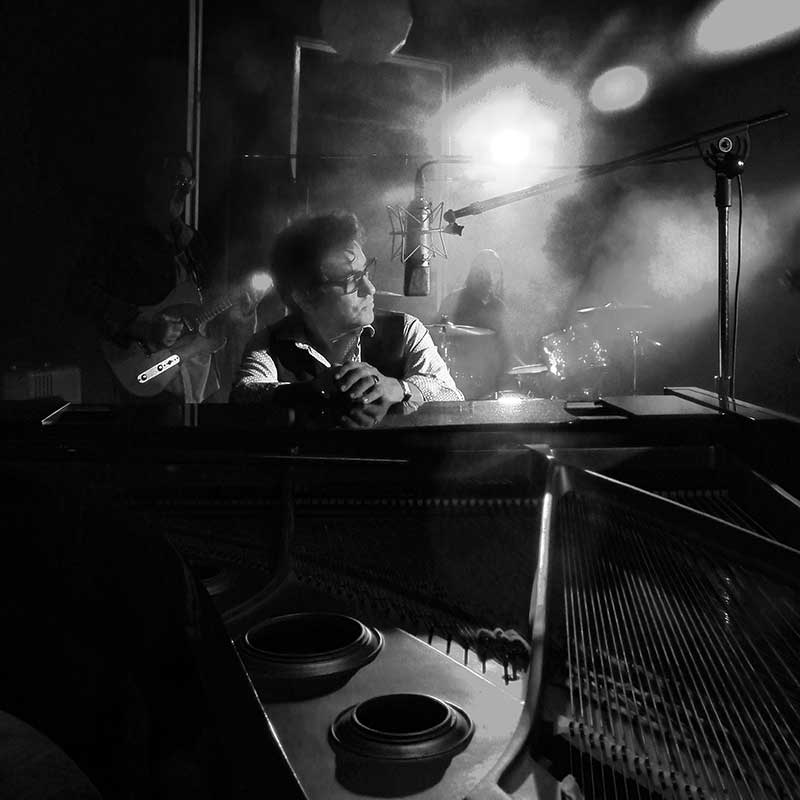
Photo of A.J. Croce by Jim Shea
Chic Compass: I can hear in your voice that you’re excited and interested in everything you’re doing and having a great time. I know this is a cliché question, but I must ask: What has been your experience of putting together a show where you play your father’s songs? Finally, at the age of 50, you decided it was time. What caused you to create this show?
A.J. Croce: The experience was different than I expected. First, it took a long time for me to get there. First, I wanted my own identity. Second, I was constantly compared to my father, and I didn’t want to give the public another reason to compare us. However, behind the scenes for 30 years, I’ve been promoting my father’s music, celebrating his legacy as a publisher and ensuring that new generations hear his music. So as someone making sure that his music is archived and his legacy is protected and cherished, I’ve played a big role.
I heard some recordings of my father’s that particularly resonated—they were not his big hits—it was his music before he could make a living. He would play other people’s songs, and there was one recording where he played obscure music from mostly the ’20s, ’30s and ’40s. Strangely enough, these were the songs I had played since I was 13. I realized we had this musical connection, this love of the old music. We chose the same songs from the same obscure artists. These are the deep cuts, and I realized we had that connection.
As his 70th birthday approached, I decided to play a small show as a tribute. I played a bunch of his music, and the reaction from the audience was powerful, beautiful and emotional. I realized the sweetness of playing some of his songs, and I also discovered that if I were going to perform his music, it would be time to create an entire show. I needed to figure out how to write a show that would incorporate my father and myself and the influences that we both had that make us who we are as artists.
I use that in the present tense because his music is just as alive. A beautiful thing about art is that if people enjoy the music, then no artist truly dies. I put a show together, wrote introductions and ensured people knew the songs’ history. My father was a storyteller. He could play a two-hour show and only four or five songs because he talked so much. People loved it. Storytelling was an important part of his artistry.
Then, as an artist, who grew up playing improvisational music and not ever wanting to play the same thing, I had to create a skeleton for this piece—a framework for everything to fit in that had a beginning, a middle and an end. But also, one that was very flexible and allowed me to be creative night after night. I discovered that I didn’t want to perform his music because of a comparison, but what ended up happening was that people fell in love with what I do, and I gained a bigger audience through that concert than I could have ever imagined. I played to more packed houses than ever, and it was not just his music. It was not just my music; it was the celebration of two generations—a father and a son—and the circumstances in which we met and became intertwined as artists.
Chic Compass: You wrote a song for your children on your newest album. What does being a father mean to you and passing along that love and generational wisdom?
A.J. Croce: I mean, they never want to listen to it. (He laughs.) It’s important that my children learn things for themselves, in their own way, in their own time. I feel grateful that my children love me and call me all the time. We can laugh and talk about anything.
Chic Compass: San Diego was your home for many years, and of course, your family-owned Croce’s was in the Gaslamp Quarter. Ingrid Croce’s vision of creating a space to celebrate Jim Croce’s memory has been fully realized since the restaurant was opened in 1985. You still have people who love you, and I know you will be playing at Humphreys as one of your tour stops.
A.J. Croce: It’s a beautiful place, and my daughter still lives there. My mother and stepfather also live there, so I visit often. My son lives in Los Angeles. Even though I haven’t lived there in many years, I love going back to Southern California.
Chic Compass: Is there anything you’ve always wanted to say in an interview but have never been asked?
A.J. Croce: We touched on the subject a little bit. When I do interviews, I think there’s a natural inclination for people to be fascinated by the tragedies in my life: my father dying when I was young, losing most of my sight as a kid, my house burning down at 15 and my wife dying prematurely. Not often enough am I able to talk about the fact that there’s a second chapter. I’m in love. Out of those experiences of loss and pain, there’s something more. We get to choose how we deal with our tragedies. We get to choose how we want our dreams to end. I’ve opened up a new chapter in my life, and I’m very happy!

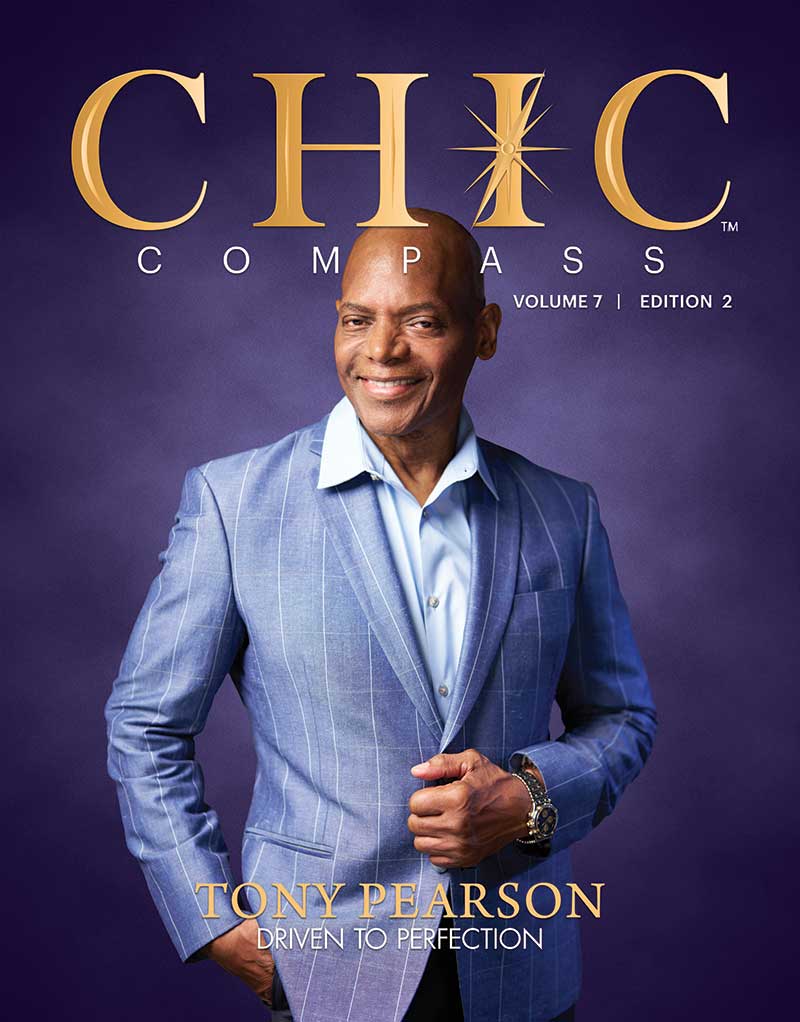

Leave A Comment